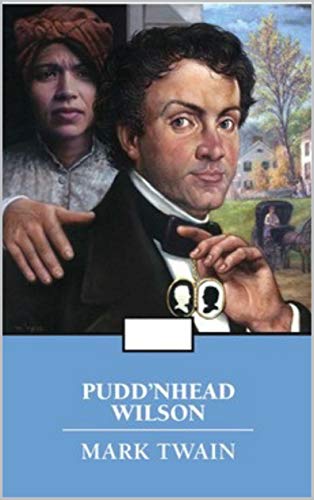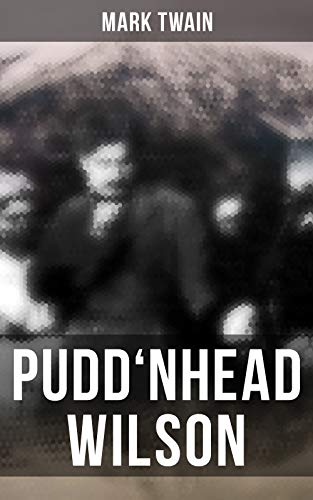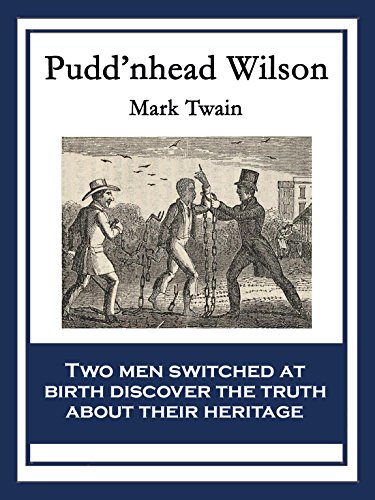-
Pudd'nhead Wilson
Mark Twain
eBook (, June 13, 2020)Pudd'nhead Wilson (1894) is a novel by American writer Mark Twain. Its central intrigue revolves around two boys—one, born into slavery, with 1/32 black ancestry; the other, white, born to be the master of the house. The two boys, who look similar, are switched at infancy. Each grows into the other's social role.The story was serialized in The Century Magazine (1893-1894), before being published as a novel in 1894.Mark Twain's satire humorously and pointedly lambastes everything from small-town politics and religious beliefs to slavery and racism.Irony and small-town life:David Wilson makes a joke that is misunderstood by the townsfolk of Dawson's Landing, who take Wilson's words literally. They consider the subtle, intelligent Wilson to be a simpleton. Word of the joke spreads quickly, and Wilson becomes known as "Pudd'nhead" for being a fool in the eyes of the townspeople.Racism and nature versus nurture:The first part of the book seems to satirize racism in antebellum Missouri by exposing the fragility of the dividing line between white and black. The new Tom Driscoll is accepted by a family with high Virginian ancestry as its own, and he grows up to be corrupt, self-interested, and distasteful.The reader does not know, at the end of the story, whether Tom's behavior results from nature or nurture. One could interpret the story as a vindication of racism based on biological differences too subtle to be seen. (The essentialism is not reciprocal, however. Chambers adapts well to life as a slave and fails to successfully assume his proper place as a high-class white.)Technology and subversion:The novel features the technological innovation of the use of fingerprints as forensic evidence. "The reader knows from the beginning who committed the murder, and the story foreshadows how the crime will be solved. The circumstances of the denouement, however, possessed in its time great novelty, for fingerprinting had not then come into official use in crime detection in the United States. Even a man who fooled around with it as a hobby was thought to be a simpleton, a 'pudd'nhead'."
-
Pudd'nhead Wilson
Mark Twain
language (, May 11, 2019)Pudd'nhead Wilson (1894) is a novel by American writer Mark Twain. Its central intrigue revolves around two boys—one, born into slavery, with 1/32 black ancestry; the other, white, born to be the master of the house. The two boys, who look similar, are switched at infancy. Each grows into the other's social role. "Pudd'nhead" Wilson is left in the background as the focus shifts to the slave Roxy, her son, and the family they serve. Roxy is one-sixteenth black and majority white, and her son Valet de Chambre (referred to as "Chambers") is 1/32 black. Roxy is principally charged with caring for her inattentive master's infant son Tom Driscoll, who is the same age as her own son. After fellow slaves are caught stealing and are nearly sold "down the river" to a master in the Deep South, Roxy fears for her son and herself. She considers killing her boy and herself, but decides to switch Chambers and Tom in their cribs to give her son a life of freedom and privilege.The story was serialized in The Century Magazine (1893–4), before being published as a novel in 1894.
-
Pudd'nhead Wilson
Mark Twain
eBook (, Dec. 19, 2017)Pudd'nhead Wilson (1894) is a novel by American writer Mark Twain. Its central intrigue revolves around two boys—one, born into slavery, with 1/32 black ancestry; the other, white, born to be the master of the house. The two boys, who look similar, are switched at infancy. Each grows into the other's social role.
-
Pudd'nhead Wilson
Mark Twain
eBook (, July 1, 2020)Pudd'nhead Wilson (1894) is a novel by American writer Mark Twain. Its central intrigue revolves around two boys—one, born into slavery, with 1/32 black ancestry; the other, white, born to be the master of the house. The two boys, who look similar, are switched at infancy. Each grows into the other's social role.The story was serialized in The Century Magazine (1893-1894), before being published as a novel in 1894.Mark Twain's satire humorously and pointedly lambastes everything from small-town politics and religious beliefs to slavery and racism.Irony and small-town life:David Wilson makes a joke that is misunderstood by the townsfolk of Dawson's Landing, who take Wilson's words literally. They consider the subtle, intelligent Wilson to be a simpleton. Word of the joke spreads quickly, and Wilson becomes known as "Pudd'nhead" for being a fool in the eyes of the townspeople.Racism and nature versus nurture:The first part of the book seems to satirize racism in antebellum Missouri by exposing the fragility of the dividing line between white and black. The new Tom Driscoll is accepted by a family with high Virginian ancestry as its own, and he grows up to be corrupt, self-interested, and distasteful. The reader does not know, at the end of the story, whether Tom's behavior results from nature or nurture. One could interpret the story as a vindication of racism based on biological differences too subtle to be seen. (The essentialism is not reciprocal, however. Chambers adapts well to life as a slave and fails to successfully assume his proper place as a high-class white.)Technology and subversion:The novel features the technological innovation of the use of fingerprints as forensic evidence. "The reader knows from the beginning who committed the murder, and the story foreshadows how the crime will be solved. The circumstances of the denouement, however, possessed in its time great novelty, for fingerprinting had not then come into official use in crime detection in the United States. Even a man who fooled around with it as a hobby was thought to be a simpleton, a 'pudd'nhead'."
-
Pudd'nhead Wilson
Mark Twain
language (, Feb. 16, 2020)Pudd'nhead Wilson (1894) is a novel by American writer Mark Twain. Its central intrigue revolves around two boys—one, born into slavery, with 1/32 black ancestry; the other, white, born to be the master of the house. The two boys, who look similar, are switched at infancy. Each grows into the other's social role.The story was serialized in The Century Magazine (1893-1894), before being published as a novel in 1894.
-
Pudd'nhead Wilson
Mark Twain
Mass Market Paperback (Simon & Schuster, Nov. 1, 2004)ENDURING LITERATURE ILLUMINATED BY PRACTICAL SCHOLARSHIP Mark Twain's darkly comic short classic set in the antebellum South stands as a literary condemnation of slavery and racial inequality. EACH ENRICHED CLASSIC EDITION INCLUDES: A concise introduction that gives readers important background information A chronology of the author's life and work A timeline of significant events that provides the book's historical context An outline of key themes and plot points to help readers form their own interpretations Detailed explanatory notes Critical analysis, including contemporary and modern perspectives on the work Discussion questions to promote lively classroom and book group interaction A list of recommended related books and films to broaden the reader's experience Enriched Classics offer readers affordable editions of great works of literature enhanced by helpful notes and insightful commentary. The scholarship provided in Enriched Classics enables readers to appreciate, understand, and enjoy the world's finest books to their full potential. SERIES EDITED BY CYNTHIA BRANTLEY JOHNSON Z+
Z+
-
Pudd'nhead Wilson
Mark Twain
language (, Dec. 6, 2019)Pudd'nhead Wilson (1894) is a novel by American writer Mark Twain. Its central intrigue revolves around two boys—one, born into slavery, with 1/32 black ancestry; the other, white, born to be the master of the house. The two boys, who look similar, are switched at infancy. Each grows into the other's social role. The story was serialized in The Century Magazine (1893–4), before being published as a novel in 1894
-
PUDD'NHEAD WILSON
Mark Twain
language (Superanda, Sept. 11, 2016)This eBook has been formatted to the highest digital standards and adjusted for readability on all devices.At the Missouri frontier town, on the banks of the Mississippi River, the intrigue revolves around two boys—one, born into slavery, with 1/32 black ancestry; the other, white, born to be the master of the house. The two boys, who look similar, are switched at infancy and each grows into the other's social role.
-
Pudd’nhead Wilson
Mark Twain, Werner Sollors
Paperback (Belknap Press: An Imprint of Harvard University Press, Feb. 9, 2015)When a murder takes place in Dawson’s Landing, Missouri, the lives of twin Italian noblemen, the courageous slave Roxy, her 1/32nd “black” son who has been raised “white,” and a failing lawyer with an intense interest in the science of fingerprinting become tangled. The unsolved riddle at the heart of Pudd’nhead Wilson is less the identity of the murderer than it is the question of whether nature or nurture makes the man. In his introduction, Werner Sollors illuminates the complex web of uncertainty that is the switched-and-doubled-identity world of Twain’s novel. This edition follows the text of the 1899 De Luxe edition and for the first time reprints all the E. W. Kemble illustrations that accompanied it.Since 1959 The John Harvard Library has been instrumental in publishing essential American writings in authoritative editions.
-
Pudd’nhead Wilson: With linked Table of Contents
Mark Twain
language (Wilder Publications, June 10, 2015)Two men switched at birth discover the truth about their heritage and neither will ever be the same. A novel about fate and racism, this was Twain's late important novel. There is no character, howsoever good and fine, but it can be destroyed by ridicule, howsoever poor and witless.
-
Pudd'nhead Wilson
Mark Twain
Hardcover (Palala Press, Nov. 20, 2015)This work has been selected by scholars as being culturally important, and is part of the knowledge base of civilization as we know it. This work was reproduced from the original artifact, and remains as true to the original work as possible. Therefore, you will see the original copyright references, library stamps (as most of these works have been housed in our most important libraries around the world), and other notations in the work.This work is in the public domain in the United States of America, and possibly other nations. Within the United States, you may freely copy and distribute this work, as no entity (individual or corporate) has a copyright on the body of the work.As a reproduction of a historical artifact, this work may contain missing or blurred pages, poor pictures, errant marks, etc. Scholars believe, and we concur, that this work is important enough to be preserved, reproduced, and made generally available to the public. We appreciate your support of the preservation process, and thank you for being an important part of keeping this knowledge alive and relevant. Z
Z
-
Pudd'nhead Wilson
Mark Twain
Library Binding (Buccaneer Books, June 1, 1987)A slave of mixed blood substitutes her son with her master's son.